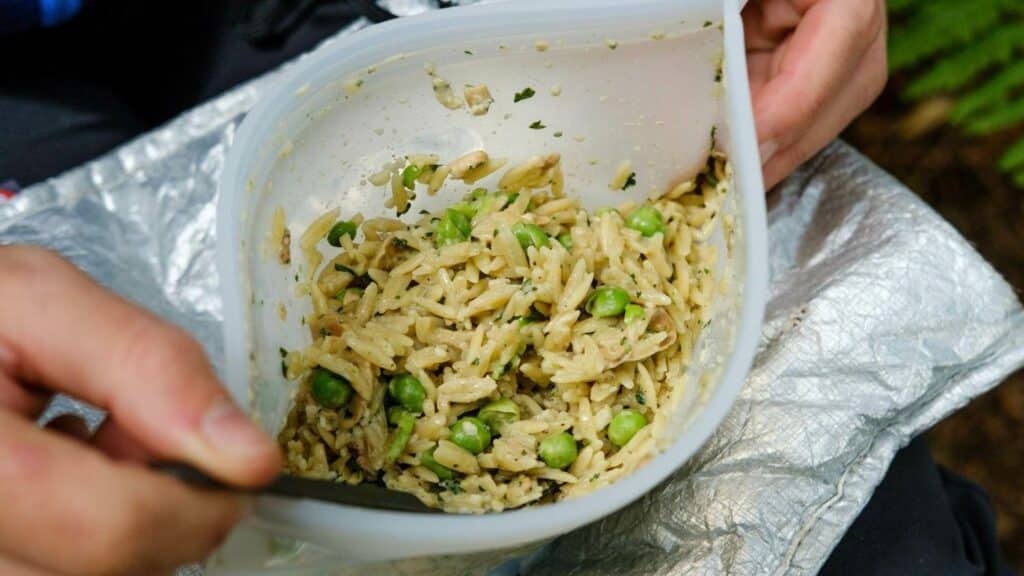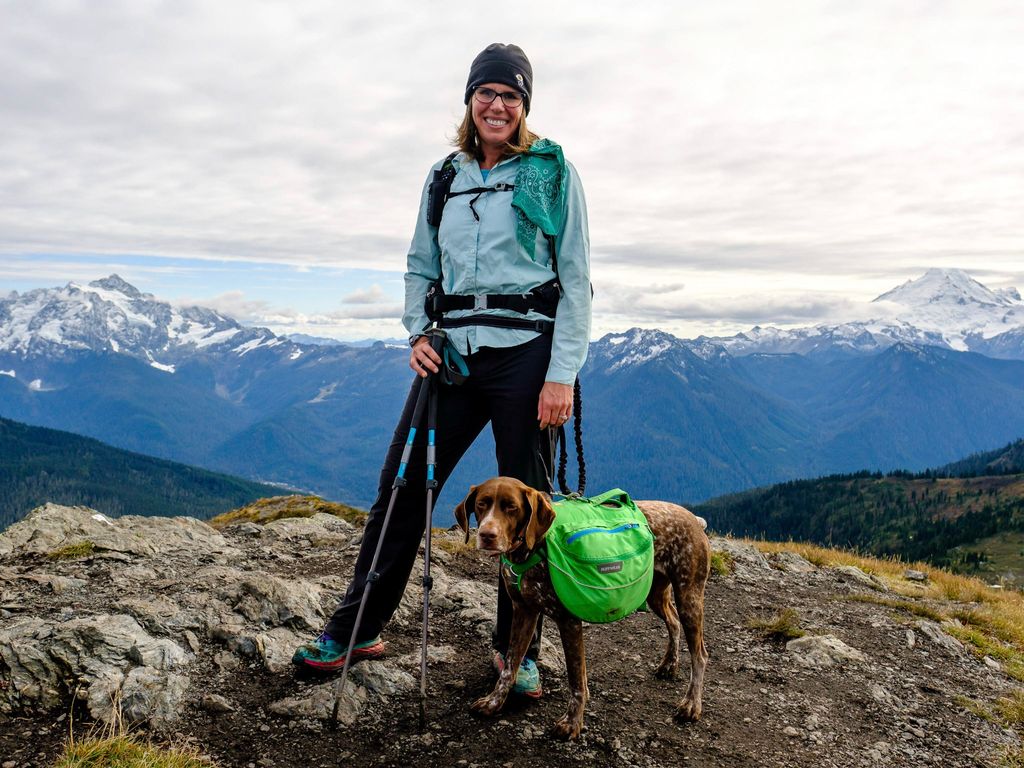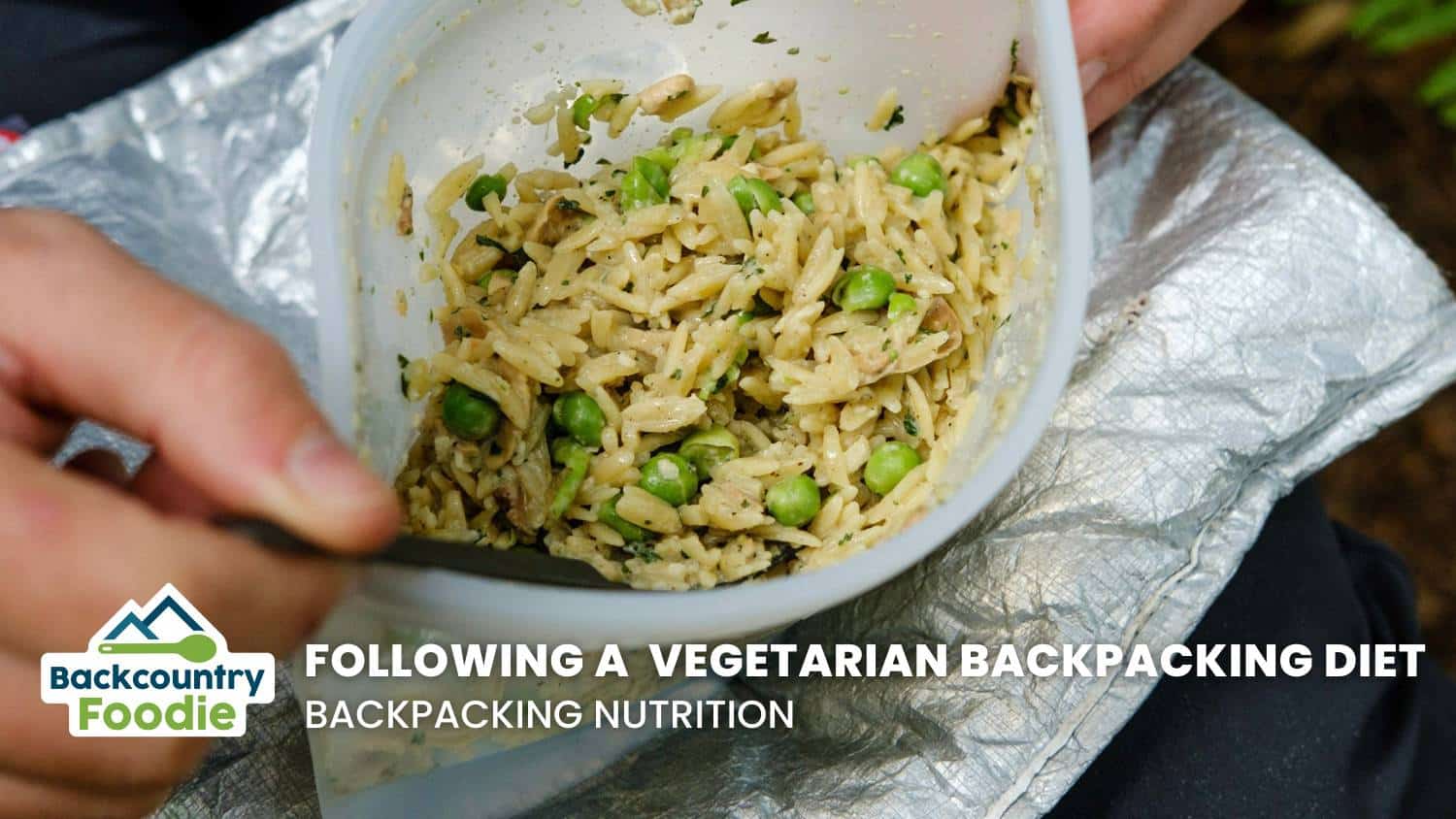How to Follow a Nutritious Vegetarian Backpacking Diet
By Ashley Napoleon & Aaron Owens Mayhew, MS, RDN, CD
Updated January 14, 2024
This post may contain affiliate links.

Have you noticed the growing popularity of following a vegetarian diet in 2020?
As a result of life in a pandemic, there is a noted focus on health and wellness. This is due to several factors. For instance, you may want to have a more positive impact on the environment, save money on groceries, or have a stronger immune system to avoid catching COVID-19.
According to “The Sydney Morning Herald” a vegetarian diet with a higher intake of fruits, vegetables, whole grains, nuts, and seeds provides important nutrients that help strengthen the immune system.
There are many benefits to eating a vegetarian diet, but you could be missing important vitamins and minerals typically provided by meat if adequate plant-based alternatives are not consumed.

Six key nutrients potentially missing in a vegetarian diet and associated risks:
✔️ Calcium – Fragile bones
✔️ Iron – Anemia (fatigue, weakness, lightheadedness, headaches)
✔️ Protein – Weakness, fatigue, and muscle breakdown
✔️ Vitamin D – Fragile bones, bone pain, fatigue
✔️ Zinc – Dry skin, flaky nails, loss of appetite, diarrhea, and nausea
✔️ Vitamin B12 – Tingling and numbness in hands, legs, and feet
By focusing on a few simple tips, you can ensure that your vegetarian diet covers your needs.
Six tips for eating a balanced vegetarian diet:
✔️ Focus on whole grains such as oats, brown rice, quinoa, and whole-wheat pasta.
✔️ Include a protein source such as tofu, tempeh, or edamame at every meal.
✔️ Consume legumes and seeds such as beans, lentils, trail mixes, and nut butter.
✔️ Enjoy plant-based sources of calcium and vitamin D, such as fortified non-dairy milk and tofu.
✔️ Eat high-iron foods with a source of vitamin C to increase iron absorption (e.g., eat fortified cereal with freeze-dried berries).
✔️ Include sources of vitamin B12 (eggs or dairy for vegetarians, nutritional yeast, and fortified non-dairy milk for vegans).

Is it possible to follow a vegetarian diet as a backpacker and stay healthy?!?
Absolutely!
Many people believe eating meat is necessary to stay fit. On the contrary, you can meet your nutritional needs as an endurance athlete without animal protein. You may wonder how difficult it is to cook vegetarian meals in the backcountry. Interestingly enough, you can prepare ahead of time and make vegetarian meals that can be cooked using various methods.
Eating a variety of food groups creates an overall healthy diet. Firstly, food is versatile. For whatever reason, if you choose to remove meat from your diet, there are ways to make up for the nutrients it provides. Secondly, having a well-rounded vegetarian diet out on the trails is not impossible. The best way to do this is to translate the food you like at home into a form with a lighter weight and longer shelf-life.
Five tips for eating a balanced vegetarian diet while backpacking:
✔️ Swap fresh foods for dehydrated or freeze-dried ones.
- Dried fruit and dehydrated veggies
✔️ Include protein at every meal and snack.
- Milk, cheese, and egg white powders, nuts and seeds, nut butter and hummus
✔️ Focus on complex carbohydrates.
- Pack minute brown rice, dried quinoa, and instant oats.
✔️ Schedule consistent meal and snack times.
- Eat every 60-90 minutes, even without feeling hungry!
✔️ Pack supplements.
- Sprinkle nutritional yeast on top of meals to add a cheesy flavor.
- Pack Carnation Breakfast Essentials® packets or powdered protein mixes for snacks or meal replacements.
- Buy fortified energy or granola bars such as Luna® or Clif®.
- Consider bringing a multivitamin on longer trips.
Alternatively, you may consider packaged food products to store in your backpack.
In this case, ditch the common junk food like candy bars, potato chips, and pop-tarts. Without a doubt, these options are easy to grab and appealing to the taste buds, but they don’t usually provide long-lasting fuel for your workout. Above all, everything is best in moderation for these “fast food” options.
Hopefully, this post has given you some confidence in your vegetarian diet. Or maybe you’ll feel empowered to change at home or for your next backpacking adventure. But, most importantly…
Embracing a vegetarian diet can ensure you eat healthily and live well.
Ready to learn more about backpacking nutrition?
Backcountry Foodie is your go-to resource for over 200 ultralight backpacking recipes, an automated meal planning tool, sample ultralight backpacking meal plans, virtual masterclasses, YouTube videos, and podcast interviews.

Did you find this post helpful?
Check out these blog posts…
- Backpacking Nutrition: Fueling Farther Using the Goldilocks Approach
- How to Create a Quick & Easy Backpacking Meal Plan
- Cold Soaking Guide for Stoveless Backpackers
- Trail Nutrition: 5 Possible Nutrient Deficiencies
ABOUT THE AUTHORS:
Ashley Napoleon was a nutrition intern mentored by Aaron Owens Mayhew, MS, RDN, CD. She is an aspiring registered dietitian, completing her Dietetic Internship through Seattle Pacific University. Some of her favorite hobbies include working out, reading, watching Disney movies, and baking. One thing she really loves about food and nutrition is how it speaks to everyone of various cultures and backgrounds. Follow her love for food, the holidays, and supporting her community through her Instagram at @ashley.napo3.
Aaron Owens Mayhew, MS, RDN CD, is a registered dietitian and ultralight long-distance backpacker with over 20 years of nutrition and backpacking experience. She’s also the founder and owner of Backcountry Foodie, an online ultralight recipes and meal planning platform for backpackers. She also enjoys teaching hikers about backpacking nutrition via virtual masterclasses, YouTube videos, and podcast episodes. You can follow Aaron’s adventures in the kitchen and the backcountry via Instagram and Facebook.




Leave a Reply